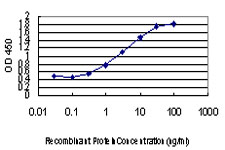ABCC8 Antibody (monoclonal) (M01)
Mouse monoclonal antibody raised against a partial recombinant ABCC8.
- SPECIFICATION
- CITATIONS
- PROTOCOLS
- BACKGROUND

Application
| WB, E |
|---|---|
| Primary Accession | Q09428 |
| Other Accession | NM_000352 |
| Reactivity | Human |
| Host | mouse |
| Clonality | Monoclonal |
| Isotype | IgG2a Kappa |
| Clone Names | 3G5 |
| Calculated MW | 176992 Da |
| Gene ID | 6833 |
|---|---|
| Other Names | ATP-binding cassette sub-family C member 8, Sulfonylurea receptor 1, ABCC8, HRINS, SUR, SUR1 |
| Target/Specificity | ABCC8 (NP_000343, 611 a.a. ~ 710 a.a) partial recombinant protein with GST tag. MW of the GST tag alone is 26 KDa. |
| Dilution | WB~~1:500~1000 |
| Format | Clear, colorless solution in phosphate buffered saline, pH 7.2 . |
| Storage | Store at -20°C or lower. Aliquot to avoid repeated freezing and thawing. |
| Precautions | ABCC8 Antibody (monoclonal) (M01) is for research use only and not for use in diagnostic or therapeutic procedures. |

Thousands of laboratories across the world have published research that depended on the performance of antibodies from Abcepta to advance their research. Check out links to articles that cite our products in major peer-reviewed journals, organized by research category.
info@abcepta.com, and receive a free "I Love Antibodies" mug.
Provided below are standard protocols that you may find useful for product applications.
Background
The protein encoded by this gene is a member of the superfamily of ATP-binding cassette (ABC) transporters. ABC proteins transport various molecules across extra- and intra-cellular membranes. ABC genes are divided into seven distinct subfamilies (ABC1, MDR/TAP, MRP, ALD, OABP, GCN20, White). This protein is a member of the MRP subfamily which is involved in multi-drug resistance. This protein functions as a modulator of ATP-sensitive potassium channels and insulin release. Mutations and deficiencies in this protein have been observed in patients with hyperinsulinemic hypoglycemia of infancy, an autosomal recessive disorder of unregulated and high insulin secretion. Mutations have also been associated with non-insulin-dependent diabetes mellitus type II, an autosomal dominant disease of defective insulin secretion. Alternative splicing of this gene has been observed; however, the transcript variants have not been fully described.
References
COMMON VARIANTS IN 40 GENES ASSESSED FOR DIABETES INCIDENCE AND RESPONSE TO METFORMIN AND LIFESTYLE INTERVENTIONS IN THE DIABETES PREVENTION PROGRAM. Jablonski KA, et al. Diabetes, 2010 Aug 3. PMID 20682687.Variation at the NFATC2 Locus Increases the Risk of Thiazolinedinedione-Induced Edema in the Diabetes REduction Assessment with ramipril and rosiglitazone Medication (DREAM) Study. Bailey SD, et al. Diabetes Care, 2010 Jul 13. PMID 20628086.Physiogenomic analysis of statin-treated patients: domain-specific counter effects within the ACACB gene on low-density lipoprotein cholesterol? Rua?o G, et al. Pharmacogenomics, 2010 Jul. PMID 20602615.A Large-scale genetic association study of esophageal adenocarcinoma risk. Liu CY, et al. Carcinogenesis, 2010 Jul. PMID 20453000.Combining genetic markers and clinical risk factors improves the risk assessment of impaired glucose metabolism. Ruchat SM, et al. Ann Med, 2010 Apr. PMID 20384434.
If you have used an Abcepta product and would like to share how it has performed, please click on the "Submit Review" button and provide the requested information. Our staff will examine and post your review and contact you if needed.
If you have any additional inquiries please email technical services at tech@abcepta.com.













 Foundational characteristics of cancer include proliferation, angiogenesis, migration, evasion of apoptosis, and cellular immortality. Find key markers for these cellular processes and antibodies to detect them.
Foundational characteristics of cancer include proliferation, angiogenesis, migration, evasion of apoptosis, and cellular immortality. Find key markers for these cellular processes and antibodies to detect them. The SUMOplot™ Analysis Program predicts and scores sumoylation sites in your protein. SUMOylation is a post-translational modification involved in various cellular processes, such as nuclear-cytosolic transport, transcriptional regulation, apoptosis, protein stability, response to stress, and progression through the cell cycle.
The SUMOplot™ Analysis Program predicts and scores sumoylation sites in your protein. SUMOylation is a post-translational modification involved in various cellular processes, such as nuclear-cytosolic transport, transcriptional regulation, apoptosis, protein stability, response to stress, and progression through the cell cycle. The Autophagy Receptor Motif Plotter predicts and scores autophagy receptor binding sites in your protein. Identifying proteins connected to this pathway is critical to understanding the role of autophagy in physiological as well as pathological processes such as development, differentiation, neurodegenerative diseases, stress, infection, and cancer.
The Autophagy Receptor Motif Plotter predicts and scores autophagy receptor binding sites in your protein. Identifying proteins connected to this pathway is critical to understanding the role of autophagy in physiological as well as pathological processes such as development, differentiation, neurodegenerative diseases, stress, infection, and cancer.



